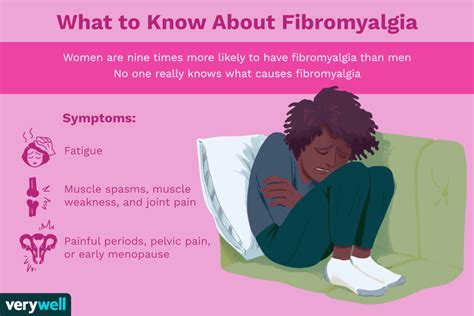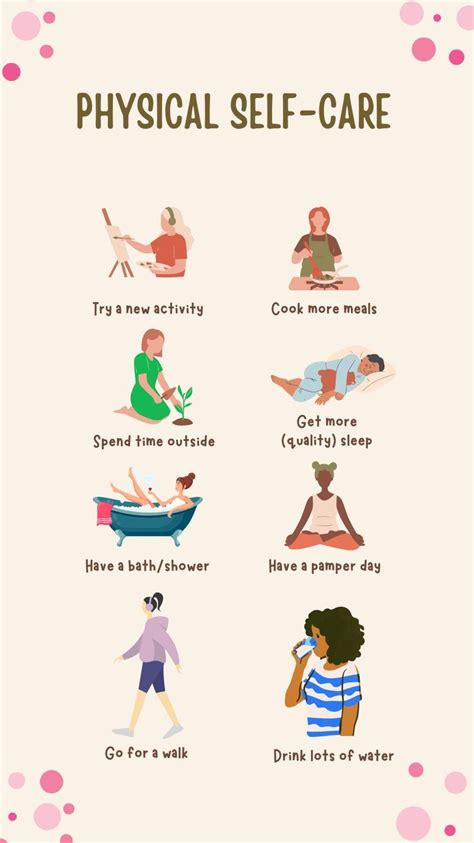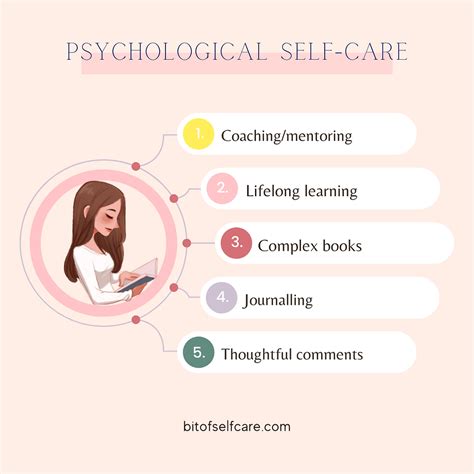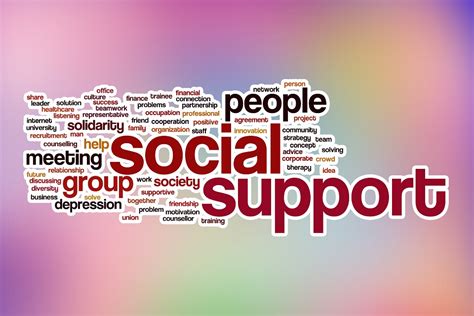Intro
Manage fibromyalgia symptoms with effective self-care tips, including stress reduction, exercise, and lifestyle changes, to improve overall well-being and alleviate chronic pain, fatigue, and sleep issues.
Living with fibromyalgia can be a challenging and overwhelming experience, affecting not only the body but also the mind and spirit. Fibromyalgia is a chronic condition characterized by widespread muscle pain, fatigue, and tender points. It can impact daily life, making simple tasks feel like monumental challenges. However, with the right approach to self-care, individuals with fibromyalgia can manage their symptoms, improve their quality of life, and find ways to thrive despite their condition.
Understanding and managing fibromyalgia requires a holistic approach that considers physical, emotional, and mental well-being. It's essential to recognize that everyone's experience with fibromyalgia is unique, and what works for one person may not work for another. This is why self-care is so crucial - it allows individuals to tailor their care to their specific needs and preferences. By focusing on self-care, people with fibromyalgia can empower themselves to take control of their health, make informed decisions, and find ways to live a fulfilling life.
The importance of self-care for individuals with fibromyalgia cannot be overstated. It is a proactive approach to managing symptoms, preventing flare-ups, and improving overall well-being. Self-care is not a one-size-fits-all solution; rather, it involves exploring various strategies and techniques to find what works best for each individual. This might include lifestyle changes, stress management techniques, exercise, dietary adjustments, and seeking support from healthcare professionals, family, and friends. By embracing self-care, individuals with fibromyalgia can learn to navigate their condition with greater ease, confidence, and hope for a better tomorrow.
Understanding Fibromyalgia

Understanding fibromyalgia is the first step towards effective self-care. It's a complex condition that affects the way the brain processes pain signals, leading to amplified painful sensations. Symptoms can vary widely but often include chronic widespread pain, fatigue, sleep disturbances, and cognitive difficulties, often referred to as "fibro fog." Additionally, individuals with fibromyalgia may experience depression, anxiety, and irritability. Recognizing these symptoms and their impact on daily life is crucial for developing a personalized self-care plan.
Diagnosis and Treatment
Diagnosing fibromyalgia can be challenging due to its similarity to other conditions and the lack of specific diagnostic tests. Healthcare providers often rely on a combination of medical history, physical examinations, and the presence of tender points to make a diagnosis. Treatment typically involves a multidisciplinary approach, including medication, lifestyle modifications, and alternative therapies. While there is no cure for fibromyalgia, the right treatment plan can significantly improve symptoms and quality of life.Physical Self-Care Strategies

Physical self-care is fundamental for managing fibromyalgia symptoms. This includes engaging in gentle exercises that promote flexibility and strength without exacerbating pain. Activities like yoga, swimming, and cycling are often recommended. Additionally, practicing good sleep hygiene is crucial, as sleep disturbances are common among individuals with fibromyalgia. This might involve establishing a consistent sleep schedule, creating a relaxing bedtime routine, and ensuring the sleep environment is comfortable and conducive to rest.
Nutrition and Diet
Nutrition plays a significant role in fibromyalgia self-care. Eating a balanced diet that is rich in fruits, vegetables, whole grains, and lean proteins can help manage symptoms. Some individuals may find that certain foods trigger or worsen their symptoms, so keeping a food diary can be helpful in identifying and avoiding these triggers. Staying hydrated is also essential, as dehydration can exacerbate fatigue and pain.Emotional and Mental Self-Care

Emotional and mental self-care are just as important as physical care for individuals with fibromyalgia. Chronic pain and fatigue can lead to feelings of isolation, depression, and anxiety. Engaging in activities that bring joy and fulfillment can help counteract these feelings. This might include hobbies, spending time with loved ones, or practicing mindfulness and meditation. Seeking support from mental health professionals can also provide valuable tools and strategies for managing emotional and mental well-being.
Cognitive Behavioral Therapy (CBT)
Cognitive Behavioral Therapy (CBT) is a helpful approach for many individuals with fibromyalgia. CBT focuses on identifying and changing negative thought patterns and behaviors that can exacerbate symptoms. By learning to manage stress, reframe negative thoughts, and develop coping strategies, individuals can better navigate the challenges of fibromyalgia.Social Support and Community

Having a strong support system is vital for individuals with fibromyalgia. This can include family, friends, support groups, and online communities. Connecting with others who understand the challenges of living with fibromyalgia can provide a sense of belonging, reduce feelings of isolation, and offer practical advice and support. Additionally, educating loved ones about fibromyalgia can help them understand the condition better and provide more effective support.
Advocacy and Empowerment
Advocating for oneself is an important aspect of fibromyalgia self-care. This involves communicating needs and boundaries clearly with healthcare providers, employers, and family members. Empowerment comes from taking an active role in one's healthcare, making informed decisions, and seeking out resources and support. By advocating for themselves, individuals with fibromyalgia can ensure they receive the care and understanding they need to manage their condition effectively.Managing Flare-Ups

Despite the best self-care efforts, flare-ups can still occur. A flare-up is a period when symptoms worsen, requiring additional care and rest. Having a plan in place for managing flare-ups is crucial. This might include increasing rest, using heat or cold therapy for pain, practicing relaxation techniques, and adjusting medication as directed by a healthcare provider. It's also important to prioritize self-compassion during these times, acknowledging that flare-ups are a part of the condition and not a personal failure.
Emergency Planning
Creating an emergency plan can provide peace of mind and ensure that needs are met during severe flare-ups. This plan might include contact information for healthcare providers, a list of medications, and instructions for emergency situations. Sharing this plan with trusted individuals can ensure that help is available when needed.Conclusion and Next Steps

Living with fibromyalgia presents unique challenges, but with the right self-care strategies, individuals can manage their symptoms, improve their quality of life, and find hope and resilience. It's a journey that requires patience, self-compassion, and a willingness to explore and adapt. By embracing physical, emotional, and mental self-care, seeking support, and advocating for themselves, individuals with fibromyalgia can navigate their condition with greater ease and confidence.
We invite you to share your experiences, tips, and questions about fibromyalgia self-care in the comments below. Your insights can help others find new ways to manage their symptoms and improve their well-being. Together, we can create a supportive community that fosters understanding, empowerment, and hope for those living with fibromyalgia.
What are the most common symptoms of fibromyalgia?
+The most common symptoms of fibromyalgia include chronic widespread pain, fatigue, sleep disturbances, and cognitive difficulties, often referred to as "fibro fog." Individuals may also experience depression, anxiety, and irritability.
How is fibromyalgia diagnosed?
+Fibromyalgia is diagnosed based on a combination of medical history, physical examinations, and the presence of tender points. There are no specific diagnostic tests for fibromyalgia, making it sometimes challenging to diagnose.
What self-care strategies are most effective for managing fibromyalgia symptoms?
+Effective self-care strategies for managing fibromyalgia symptoms include gentle exercise, good sleep hygiene, a balanced diet, stress management techniques like mindfulness and meditation, and seeking social support. It's also important to work closely with healthcare providers to find the right treatment plan.
